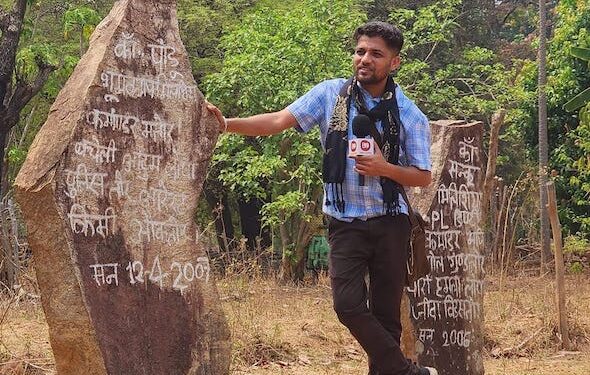Two days after the grim discovery of Bastar-based investigative journalist Mukesh Chandrakar’s body in a newly sealed septic tank, Hyderabad police have arrested contractor Suresh Chandrakar, who is the prime accused in the murder. A senior officer confirmed Suresh’s detention to The Hindu reporter Naveen Kumar, while Bastar police cited ongoing threats Mukesh faced over his reporting on corruption.
Mukesh’s brother, in his police complaint, revealed that Mukesh had received threats from Suresh and others after exposing alleged irregularities in a road construction project in Bastar. Notably, NDTV aired Mukesh’s investigation just weeks before his death.
Four months earlier, Mukesh co-wrote a report for The Wire Hindi on the arrest of four Bastar journalists, alleging that they were framed by police for reporting on illegal mining tied to prominent BJP leaders. The article suggested planted evidence was used against the journalists. Reflecting on Mukesh’s death, The Wire Hindi editor Ashutosh Bhardwaj recalled how Mukesh had expressed anxiety after receiving a threatening message from a senior police officer. “A few months later, he was found murdered,” Bhardwaj wrote, “the two episodes conjoined by a belief the administration-criminal nexus in Bastar share – that journalists can only survive at their mercy.”
A Dangerous Landscape for Indian Journalists
Mukesh’s murder underscores India’s grim reputation as one of the world’s most dangerous places for journalists. India has fallen to 161st place in the 2023 World Press Freedom Index by Reporters Sans Frontières (RSF), reflecting a sharp decline in journalist safety and independence. The organisation has criticised increasing threats to the press, including retaliatory state action and violence by political and criminal groups.
The killing of journalist Gauri Lankesh in 2017 remains a potent symbol of the risks faced by reporters. Others, like Mohammed Zubair of AltNews and Siddique Kappan, have faced harassment, imprisonment, or threats for exposing uncomfortable truths. Meanwhile, media platforms such as The Wire have faced defamation lawsuits and raids, further exacerbating concerns over press freedom.
Call for Justice and Reform
DIGIPUB, an association representing digital news organisations, has expressed shock over Mukesh’s death, urging the Chhattisgarh government to expedite the investigation and bring the culprits to justice. “Threats to the safety and security of journalists are not just posed by retaliatory action by the State but also by criminal elements, mafia groups, and local politicians,” the organisation stated, highlighting the need for stronger protections for journalists.
DIGIPUB’s statement also noted that the steady decline in India’s press freedom ranking aligns with broader attacks on democratic institutions. The association reiterated its demand for safeguarding journalist independence and called for accountability mechanisms to address growing violence and intimidation.
Mukesh Chandrakar’s death, tragically emblematic of India’s growing hostility toward journalists, demands not just justice but systemic change. Until then, the country’s free press will remain under siege, with its watchdog role compromised.











